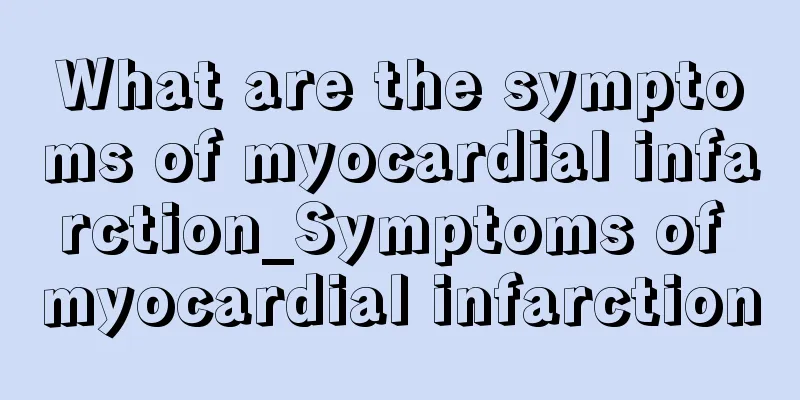What are the symptoms of myocardial infarction_Symptoms of myocardial infarction

|
Many elderly people suffer from myocardial infarction. Myocardial infarction is one of the main manifestations of heart disease and can cause great harm to people's bodies. Because the human heart is the main part that produces and supplies blood to the whole body, if the blood vessels in the heart are blocked, it will lead to poor blood circulation in the human body. In severe cases, it will cause people to often experience heart discomfort or shortness of breath. So, what are the symptoms of myocardial infarction? What does a heart attack feel like? Symptoms of a heart attack: 1. Worsening of angina If you find that your angina pectoris is getting more and more severe, such as chest pain that occurs more frequently and covers a larger area than before, the pain becomes more severe, the pain lasts longer, etc., these symptoms are symptoms of myocardial infarction. Don't think that it will be gone in a while, as this is a typical sign of an impending myocardial infarction. 2. Sudden feeling of panic and chest tightness If you suddenly find yourself feeling anxious, chest tightness, and weakness in your hands and feet, and you have never experienced such a situation before, you should take it seriously and go to the hospital immediately for treatment. These are common symptoms of myocardial infarction and you must pay special attention to them. Failure to provide timely treatment will threaten the patient's life. You must seize the golden opportunity for treatment. 3. Chest tightness when resting at night Under normal circumstances, diseases such as myocardial infarction occur at night. That is to say, if you find yourself experiencing constant pain in the front area of your heart at night, you should pay special attention to it, as it means you have had a myocardial infarction. Timely treatment can effectively prevent the area of the myocardial infarction from becoming too large. 4. Sudden pain without any cause If you have a history of angina pectoris, it is normal to experience frequent uncomfortable symptoms. However, if you have never had such an experience and still experience pain, and if you also have profuse sweating, vomiting, nausea, etc., you must seek medical attention immediately, as you may have a myocardial infarction. |
>>: Pain in the thigh when walking
Recommend
What are the early symptoms of osteosarcoma
Osteosarcoma is a malignant tumor that seriously ...
What is the reason for a low-grade fever that won't go away
Cold is a disease with a very high incidence rate...
Which age group has the most severe recurrence of colorectal cancer
In which age group is the recurrence of colorecta...
Can I have sex when I am more than 40 days pregnant?
When a woman is more than 40 days pregnant, some ...
This is what congenital glaucoma is all about
The medical term glaucoma appears very frequently...
Are there male and female fish?
Speaking of fish, I believe they are very common ...
What are the benefits of millet shell pillow?
The millet shell pillow is actually an ordinary p...
What medicine should I take for excessive eye mucus
When there is a lot of eye mucus, most people thi...
Gonorrhea DNA positive
The results of the gonococcal DNA test are positi...
What should I pay attention to after laryngeal cancer surgery
If a total laryngectomy is performed, it will hav...
What should I do if my throat is dry and sore
If your throat is dry and sore, then the choice o...
The best treatment for flat warts, combining Chinese and Western medicine has good results
Flat warts are most common in young and middle-ag...
How does ovarian cancer metastasize
How does ovarian cancer metastasize? Ovarian canc...
What are the ways to prevent cervical cancer? What should you eat to prevent cervical cancer!
What to eat to prevent cervical cancer? Vitamin A...
How to treat Jiuguikang rash
Pityriasis rosea is a relatively serious skin dis...









